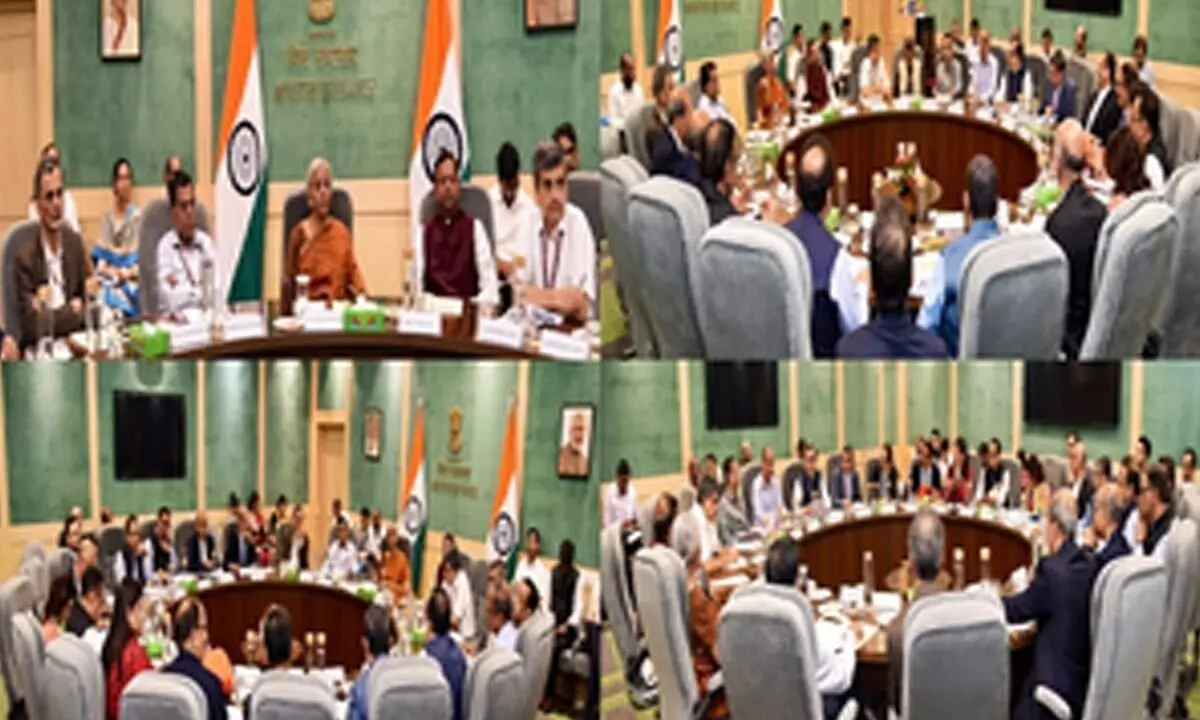Live
- Manipur violence: Much effort made, lot remains to be done, says CM Biren Singh
- 2025 New Year Affirmations: Inspiring Words to Start the Year Positively
- Man Sentenced to Death for Killing Three Children, Attempting Wife’s Murder
- Machilipatnam Police serve notices to Perni Jayasudha in ration rice case
- Devotees Flock to Vemulawada Rajarajeshwara Swamy Temple for New Year Blessings
- Former India head coach Shastri calls for implementation of two-tier Test system
- After bountiful rains, northeast monsoon withdrawal from TN expected from Jan 15
- Today’s Horoscope January 1, 2025: Get Your Daily Astrological Guidance for all Zodiac Sign
- Brother Kills Sibling Over Old Rivalry in Suryapet
- Approval of Telangana Recommendation Letters for Tirumala Darshan: A Welcome Move
Just In

Finance Minister Nirmala Sitharaman on Thursday chaired the third pre-budget consultation with industry leaders and associations in connection with the forthcoming General Budget 2024-25 here on Thursday.
New Delhi: Finance Minister Nirmala Sitharaman on Thursday chaired the third pre-budget consultation with industry leaders and associations in connection with the forthcoming General Budget 2024-25 here on Thursday.
The pre-budget consultation meeting was also attended by Union Minister of State for Finance, Pankaj Chaudhary, Finance Secretary, and Secretary, Department of Expenditure; Secretaries of Departments of Economic Affairs, DPIIT, Ministry of Heavy Industry and Ministry of MSME as well as the government's Chief Economic Adviser.
Apex business chamber, Confederation of Indian Industry (CII) has in its wish list for the Union Budget 2024-2025 urged the government to maintain corporate tax rates at current levels to provide tax certainty for businesses.
CII is also seeking rationalisation of Angel Tax by removing Section 56(2)(viib) in order to further nurture innovation & startups. According to the industry chamber, the scrapping of this section would "greatly aid in capital formation" for the startup sector.
Under Section 56(2)(viib) of the Income Tax Act, for a startup to become eligible for angel tax exemption must meet certain conditions which industry claims are cumbersome and come in the way of attracting more investments.
As far as indirect taxation is concerned, CII has in its proposals sought the removal of the restriction to avail ITC (input tax credit) "to ensure seamless flow of credit to businesses where the property being constructed is being used for further providing an output service (such as renting, etc."
CII has also sought the rationalisation and simplification of the Capital gains tax rate structure.
Besides, the apex business chamber is seeking the rationalisation of stamp duty on land and phasing out the cross-subsidy on power rates to "reduce the cost of doing business".
CII has also suggested that captive power plants (CPPS) should be brought at par with the power sector for coal pricing, allocation, and transportation.
It is also seeking a phasing out cross-subsidisation of railway passenger fares by freight to cut logistics costs for businesses.
In the pre-budget consultation meeting with the Finance Minister on Thursday, Subhrakant Panda, Immediate Past President, highlighted the importance of simplification of the tax system.
He said: "The Union Budget should continue the process of simplification and rationalisation of taxes for enhancing ease of doing business. This will also reduce tax related litigations and improve efficiency in the taxation system."
He also emphasised the need to continue supporting the growth momentum by energising demand, laying thrust on infrastructure development, taking further measures to rein in food inflation, supporting MSMEs and prioritising innovation, and research & development in the country.
In its pre-budget memorandum presented to the Finance Minister, the PHD Chamber of Commerce and Industry (PHDCCI) said that calibrated steps to enhance domestic sources of growth would be crucial to maintain a higher economic trajectory of the country.
The budget can further stimulate manufacturing sector growth to boost GDP contribution to beyond 25 per cent, fueled by the increasing export trend in high-technology products, it added.
The industry body suggested expanding the production-linked incentive (PLI) scheme beyond the 14 sectors to include medicinal plants, handicrafts, leather and footwear, gems and jewellery and the space sector, among others.

© 2024 Hyderabad Media House Limited/The Hans India. All rights reserved. Powered by hocalwire.com






